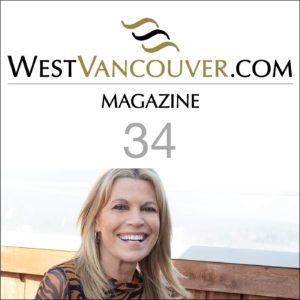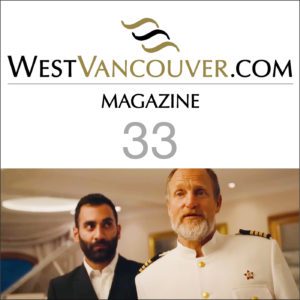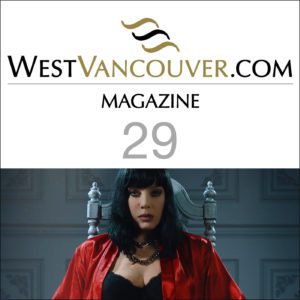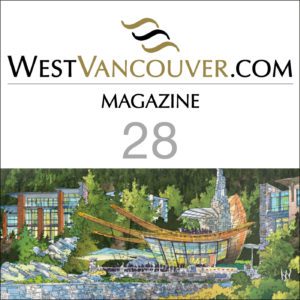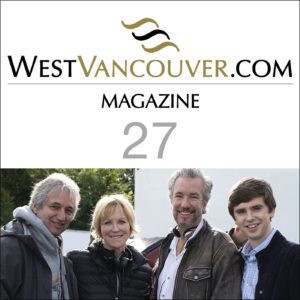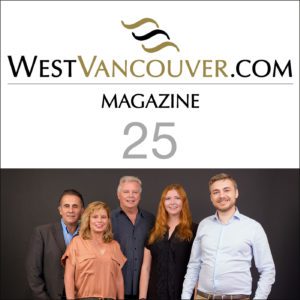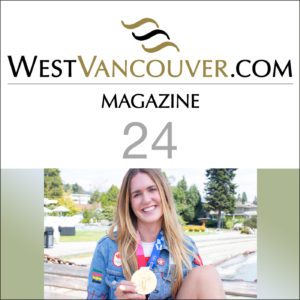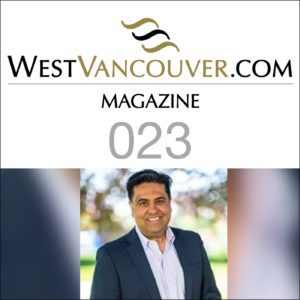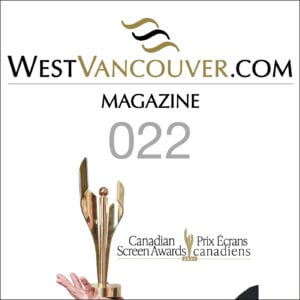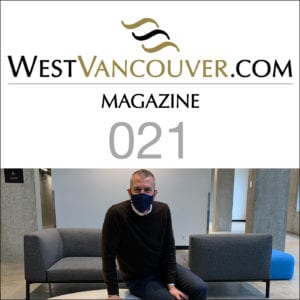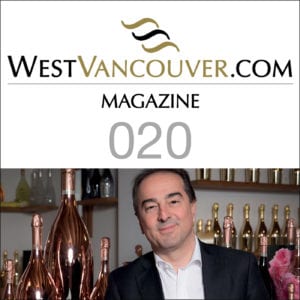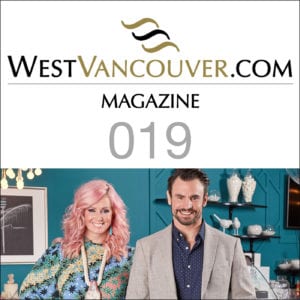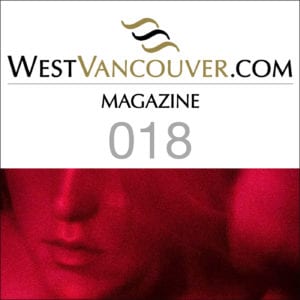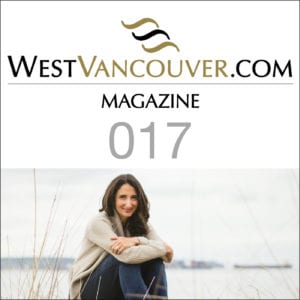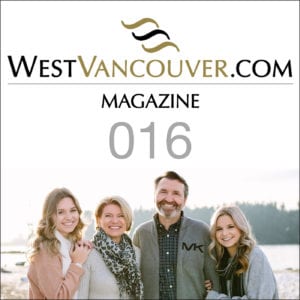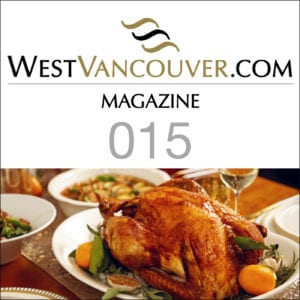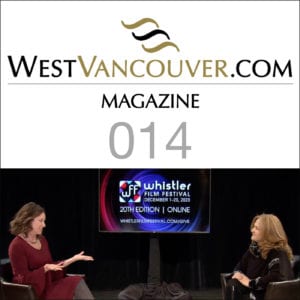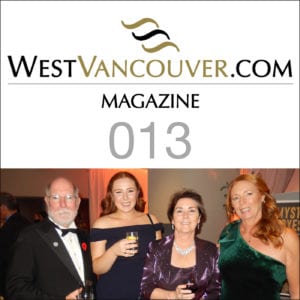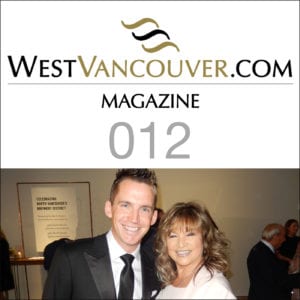Discover West Vancouver Magazine
West Vancouver Magazine

West Vancouver Magazine
Author: Catherine Barr - Publisher
Subscribed: 0Played: 17Subscribe
Share
© All content contained in these podcasts is copyrighted and cannot be reproduced or displayed without permission.
Description
West Vancouver Magazine Podcast. Live interviews with people you know and love. News and views, plus updates about local issues. Influential and relevant information with a little entertainment too. Building our new community online at WestVancouver.com - representing Canada's stylish waterfront and west coast lifestyle.
31 Episodes
Reverse
It takes a certain kind of toughness to survive in showbiz - and a whole lot of magic to make it last. Hear how game show legend Vanna White solved the biggest puzzle of all, turning her career into a ‘wheel’ of a deal, and becoming the face of ‘fortune’ we all admire.
CAT: We are so honoured to have the beautiful (and I do mean beautiful inside and out) and delightful celebrity, Ms Vanna White, co-host of Wheel of Fortune fame, with us here today. Thank you so much for joining us.
VANNA: Thank you for having me.
CAT: You’re here today supporting some very special charities, including Variety, the Children’s Charity and others. But we’re going to talk about you first. Vanna, how did it all begin? We all want to know. Did you get a phone call? What did your agent call up and say? Did you jump up and down and go, ‘Oh my gosh, this is my big break.’ Take us back to that moment and tell us where it all started.
VANNA: It all started on Dance Fever, which was a Merv Griffin show. Janet Jones at the time, who is now Janet Gretzky, is a friend of mine. And I heard they were looking for a replacement on Wheel of Fortune. And I knew it was a Merv show, so I said to Janet, ‘Hey, can you introduce me to somebody?’ And she introduced me to someone there that day, and he said, ‘If we haven’t made a decision on a Wheel of Fortune Hostess, you give us a call on October 5th.’ I called him on October 5th at 10 am, and they had not made a decision. So I went in for the audition - and got it.
CAT: So, did you know? Did you say, ‘Oh my God, this is my big break?’ Because you had done some acting, you were modelling, and you are a showbiz person. Did you know what had happened at that moment?
VANNA: Well, I knew that I was going to be on TV, so I was thrilled - and I was going to have a paying job. And at that point, the nighttime version wasn’t on yet. It was only the daytime version. So I didn’t know where it would go. So Pat Sajak and I are sitting in the makeup chair one day, and I said, ‘I wonder where we’ll be in 10 years. And it’s been 40.
CAT: She admitted that out loud, ladies and gentlemen. She admitted that out loud. (laughing)
VANNA: Let me add that I was 11 when I started. (laughing)
CAT: I was going to say - you started when you were six. So, you now have this glamorous job - and I’m going to get this one out of the way first because my listeners would never forgive me if we didn’t ask you. It’s a glamorous life. It looks like a glamorous life. And I think one of the things all of us girls go for is the clothes. Tell us about the clothes. Where do you get them? Do you get to keep them? Have you ever worn the same outfit twice? Let’s talk about the clothes.
VANNA: Great question. The clothes come from designers that send their clothes to the studio. I wear them, and then they take them back - so I do not get to keep them. And I’ve worn over 7,500+ dresses - and I’ve only repeated one - and that was by mistake.
CAT: You’re kidding. What one was it?
VANNA: I don’t remember. I was traumatized. (laughing)
CAT: Now, I don’t know about you, but when I do red carpets, and the dress is all sequins and beads and bits - between you and me, I kind of hate them. Because if you twist wrong or a bead pops and you hear it popping, or you’re breathing wrong - it’s kind of traumatic when you wreck a designer dress. Am I right? It’s kind of upsetting.
VANNA: You know, some of the dresses aren’t the most comfortable. They look gorgeous on, but you know, you’re squeezed in there. They’re tight, and you can hardly move - but they look good. So that’s the most important thing.
CAT: Well, accessories are an important part of fashion and show business. But maybe one of your better accessories is your co-host, Pat Sajak. (laughing) You guys are like peanut butter and jelly. Nobody wants to see you by yourselves. They want the team. They want Pat and Vanna. It’s not Pat by himself. That’s no good.
CAT: Welcome everybody. Catherine Barr here. We’re back with another episode of West Vancouver Magazine / Turner Magazine podcast. You can find us on Apple. You can find us on Spotify. But coming up, you’re going to find us on the red carpet because I have another fabulously exciting guest here with me today. It is Kyle Fostner, executive director of the Vancouver International Film Festival. All you film buffs will want to know this man because he knows everything there is to know about the upcoming festival. Kyle, welcome to our show.
KYLE: Thank you. Great to be here.
CAT: Now, you’ve probably had a really hectic few weeks here. As the new Executive Director, tell us a little bit about yourself and how you came to the Vancouver International Film Festival (VIFF).
KYLE: Sure, thank you. It’s true that my background is in music. I have always known that I wanted to be in the arts. I spent my 20s on the art side of things, making video art but also as an aspiring musician. I lived and worked in Montreal and released records, toured and did that whole business. Then I found myself working in music venues and worked my way up from the very bottom as a handyman to the general manager. I did this for about six to eight years before my partner and I moved out here to be closer to her family. When we arrived, I didn’t want to work in music any longer. So I dabbled in film production, and that opened the doors wider. I started as a venue manager for VIFF and quite literally worked my way back up again. This is the first full-tilt role at the festival since taking over, so I’m both excited and terrified.
CAT: Well congratulations on everything. It takes a lot to get a festival like this off the ground, and there are so many people behind the scenes. And that’s something I really love about the Vancouver International Film Festival. There isn’t just an emphasis on the red carpets and the actors and stars - there’s a lot of focus on writers, directors, musicians and more. It is about the fundamentals. It’s about all the people who work in the industry.
KYLE: The days of festivals being about ‘just going to the movies’ are over, to be honest. I think that we all spent the past few years getting through periods of isolation through streaming films, and we were able to do it on our terms. We’ve all got subscriptions to the many streaming services out there. So, you know, binge-watching is an option that’s available to everyone in their lives all the time. What VIFF offers is a deeper experience. The world is full of film festivals of all shapes and sizes, so it’s really important as a festival planner to define yourselves by your strengths.
From the written word to the visual image to the sound behind it, film is a creative decision. We are not concerned with celebrity and are not concerned with the endless red carpets and the sponsors. We’re an audience-first festival. We’re here for the community.
CAT: And there’s so much inclusiveness here at the Vancouver festival. There’s diversity and variety and so much to take in. There are talks, speakers, and even a night with the Vancouver Symphony Orchestra performing live. Tell us a little bit more about these features.
KYLE: So the ‘Talks’ series is one that I’m really proud of. It’s the bridge between industry and the general public. It’s for people who want to explore film culture beyond just the simple cinematic experience. The series is a way to find our favourite creators from around the world and then connect them with Vancouver audiences. We had a free online talk called ‘With Dean Fleischer Camp’, who’s the director and leader of Marcel the Shell with Shoes On, a 2021 comedy. It started as a viral video, and it just went wild. It’s an adorable heart-wrenching animation of this little tiny shell with a single eye and these tiny shoes and the adventures it goes on.
And then we have the industry conversations.
Welcome back everybody - back to another West Vancouver podcast. I am so honoured and privileged to have this amazing artist, singer and musician with us here today. She calls herself the ‘Super Beautiful Monster’. I prefer to call her a friend - but she is so much more than that. Please welcome the spectacular Bif Naked.
BIF: We are friends. And we go back. We go way back. That is so fun. I love it. And I love the magazine, obviously - and of course, now the podcast. What you guys have always done with the community has just been incredible. It’s always fun to keep up with what’s going on here. I’m just thrilled to be on your show.
CAT: Well we love you too. And you’re always looking good - and you’re always up to something fun. You were just back here in Vancouver recently to help support the Canadian Cancer Society’s Daffodil Ball gala event. And whenever we manage to get you on stage, we get way more than just a music performance. We get ‘you’ the real person - the person who talks about her life and her philosophies and your positivity. You share so much more than music. And you’re also a cancer survivor and can speak to that experience as well. You have that connection.
BIF: It was amazing to be there. The gala was virtual for the past two years, so it was an honour to be asked this year. They do so much and raise wonderful amounts of money for cancer research. There’s the new lodge, which I toured the day before, so it was a real full-circle moment for me.
CAT: Now, some people are lucky to get to know this side of you, but most people know you as Bif Naked music star. How did you ‘assemble’ Bif the character? How did you grow up to become this famous person? Tell us where it all began?
BIF: Well, you know, I am a performing arts kid. My parents were just regular academics who put their three daughters in ballet and dance, theatre and spoken poetry, and art festivals - like a lot of art festivals across Canada. And I just really loved it.
So I think it’s always been in my blood. And then, in university, I fell into being in a punk rock band as a vocalist. And I had no plans at all, no training, no plan at all. I always say you didn’t require a lot of talent to be in a punk rock band - you just needed to have a whole lot of heart. And it just kind of kept happening.
And eventually, I became a solo artist. Bif Naked was already a nickname that I had from the early days. It was a punk rock stage name that I kind of donned because all the guys had, you know, provocative stage names - so that set me apart. I love what I do. I’m very, very lucky.
CAT: You mentioned university - but you were also given a great honour recently. And you’ve also got an honorary degree from Simon Fraser University (SFU) as well. Tell us about that.
BIF: That was just such a joy. My dad was still alive in 2013 when the University of the Fraser Valley gave me an honourary degree in letters. So he was very proud. We lost him to prostate cancer shortly after. But my parents were both academics. They both had Master’s degrees.
So in 2020, I was lucky enough to get an honorary degree from SFU in Fine Arts. We’ll finally be able to celebrate that convocation ceremony in person at the beginning of May (as it was delayed due to Covid).
Being able to have these accolades like this - it just makes my mother so proud, and for me, I could die happy.
CAT: You are also an actor. How do you like acting compared to music? Do they play an equally important role in your life?
BIF: I would say it was the early 2000s. I was in a couple of feature films, and I enjoyed it immensely. Nicholas Lea was my co-star along with Ching Wan Lau in Lunch With Charles. And then another film I was able to do was Crossing with Crystal Buble. And it was just, you know, it was just fun. I think that my first love will always be performing live [on stage] and being in a band.
CAT: The album SuperBeautifulMonster.
With a wealth of history behind them, British Pacific Properties is looking to develop a different kind of future. Now, in a new partnership with Beedie Living, these community builders are proposing some innovative ideas to rise to the challenge while addressing a potential uprising against traffic, the environment and sustainable housing. An exclusive interview with president, and West Vancouver resident, Geoff Croll.
The new Upland development, with Hawksley and Wildwood, how does partnering with Beedie affect this?
Well, we have entitlements for over 800 homes in Rogers Creek. And if Cypress Village gets approved, they’ll be another 3,500 new market homes in Cypress Village. And one of our guiding principles as a company is ‘be a small giant’ - which means we focus on getting better rather than getting bigger.
So how do we deliver all these homes in a timely fashion without getting bigger? We find someone to work with us. Someone who shares the same core values. Someone who has the same dedication to quality and customer service. Someone who shares our commitment to community - and someone who shares our vision for the future. And the people at Beedie checked all those boxes. We’re pretty excited to supercharge our team.
The vision is large. The time commitment is enormous. The kind of home we need is changing? What does all that say?
We’ve always played the long game. We’ve been here since 1931. It’s always been a steady, slow progression across the hillside. And we’ve evolved from the 30s and the 40s and 50s to where we are today. We’re addressing the needs of the community. And we have to do it in a thoughtful step by step manner that we can create a community on the hillside that meets the needs of both the new residents and the community that’s already here.
If you go back to the company’s guiding principles, the number one thing is reverence for nature. We have to respect and conserve the natural environment that we have.
How do you respond to those who say it’s going to make the mountainside too busy - or there’s going to be too much traffic?
When we did the Rogers Creek plan back in 2008, the number one concern was the environment. Now, 13 years later, it’s traffic and housing affordability.
Traffic is a major concern in West Vancouver - and so it should be. If you look at where West Vancouver sits, it’s at the intersection of Hwy 1 and Hwy 99, and it also has a large ferry terminal that connects the Sunshine Coast to Vancouver Island. There’s also a popular ski hill in the most visited provincial park in the province (Cypress Provincial Park). Over a million cars a year travel up and down Cypress Bowl Road - none of it by public transit.
So anything we do at Cypress Village will pale in comparison to the existing and future traffic generated by [these roads].
There’s a lot that we are committed to doing to reduce traffic. So first and foremost, we are creating a complete community where it is truly possible to live, work and play without getting into a car. The village will provide all the amenities and services people need on a daily basis.
Secondly, we’re also committed to a developer-funded transit system from day one (at no cost to the taxpayer). We’ll provide regular, reliable service to Ambleside and Park Royal using electric buses (carbon-free).
Thirdly, we’re providing other transportation alternatives to the alternative single- occupancy cars, such as an integrated system of walking and biking paths. We’ll also have electric car sharing.
Welcome everybody back to another episode of WestVancouver.com / West Vancouver Magazine Podcast. Here in Hollywood North, we have lots of glam. And live on air with me today is one of those people who makes it all happen. We have Shawn Williamson here with us from Brightlight Pictures. It doesn’t get any better than this when it comes to lights, camera – action! Shawn, thank you for joining us.
Shawn
Oh, thank you, my pleasure.
Cat
Now I can only imagine what you’ve seen over 20 years of movie-making, T.V. and films. You’ve been involved in all aspects of it. Rumour also has it you’re from North Vancouver. So, where did this all start?
Shawn
Well, I did. I grew up in North Van. I went to Argyle. And so I’m a North Shore boy originally. But it started organically out of the theatre. I went to university for a very brief moment, and discovered it wasn’t really for me, and ended up working at the Arts Club Theatre where I did an apprenticeship and ultimately worked in all kinds of different technical and behind the scenes positions over the years - and ended up there as a stage manager before I transitioned into film and television.
Cat
So you weren’t the guy up front doing the tap-dancing - you were always the guy kind of behind the scenes helping put it all together? (laughs) Is that kind of accurate?
Shawn
I’ve never been on stage. (laughs) I have no talent whatsoever. So I’m very, very happy behind the camera.
Cat
Well, that’s completely not true. Because you clearly have absolute mounds of talent to be able to survive in what is an incredibly difficult industry and sometimes made more difficult by the fact that you’re Canadian. I know L.A. is a tough scene as well for anybody looking to make it big, but you’ve clearly made it big. So what exactly would you say your job title is? Tell us, what does somebody in your position do? What is your day like?
(Use the timestamps below to forward ahead in the podcast above)
Cast and Crew of ABC’s The Good Doctor - from left, David Shore, Shawn Williamson and Freddie Highmore. Photo credit: Sony Pictures Used with Permission
02:47 - Shawn
Well, it really does vary. Different producers do very different jobs. Some are working in development, finding scripts and packaging them, or putting them together with other talent, with actors, directors and studio money. And some producers, which is how I started, just grew up making movies.
Vancouver has generally been a destination for foreign films. And it certainly now has blossomed and grown and matured into a proper production destination where you can finance and package films. But earlier on, it was a destination. So I grew up in the industry making movies and television shows for U.S. studios or foreign financiers.
And so, part of my job originally was simply to make the movie. And you are effectively the employer on set. You’re the person that deals with the creative elements. You juggle all the elements that you would think - actors, directors, the studio’s desires, and the script. So you have a budget you’re working towards, and you’re spending effectively every part of that budget. But it’s largely people management, and our philosophical view in producing comes from what I learned at the Arts Club as a stage manager.
05:36 - Cat
Wow, well, I’m going to guess that there isn’t a producer’s school - this is something you had to really get in and get your hands on, as you said, use your experience. But it sounds like you really need to hone your focus and your talents on keeping all these balls in the air. I imagine the bigger the story, the bigger the script, and the bigger the cast, the more it can really run wildly out of control. So that sounds like that’s the hardest part – but what is the best part of your job?
06:18 - Shawn
The best part is the people – and telling stories. We’re making television, we’re telling stories, we’re making films and such - it doesn’t really matter when yo...
A podcast conversation with Park Royal VP Rick Amantea about the history of Park Royal and their new proposed micro-unit development.
Affordable housing. It’s a problem plaguing the Lower Mainland - and never more so than in West Vancouver, where mega-houses rule the land. Now, armed with a unique plan for the future, Park Royal VP Rick Amantea discusses how they are seeking approval for a new micro-unit complex designed specifically for singles. It strives to help solve the housing crisis with a tiny bit of innovation that still allows people to ‘live large’.
UPDATE Oct 5, 2021 - Council approved the proposal to advance to the next steps of review and consultation. The next steps in the application process include community consultation and staff review to identify issues and technical considerations for the proponent to address. Staff identified the following items that require further review: Traffic functionality, Number of parking stalls, Number and size of rental units, Potential community recreation uses in the current green space, Impacts to privacy and view corridors to properties north of the site.
Q: Tell us a little about why you have proposed this new micro-unit development?
A: As we continue to evolve, and we look
at the needs of the community, we try to examine developments and bring to the table ideas and concepts that kind of meet those needs. One of those needs is to provide housing for those individuals who work in our community and do the important work of those services and those frontline jobs.
And so when we were thinking about what we could do to address that, the notion of micro-units came up. We decided to try to bring something like that to West Vancouver to make it more affordable, make it more attainable, and really provide an opportunity for those people - those important people who work in our community.
Q: Who would want to live here?
A: The occupants are, generally speaking, those single people that want to find a more affordable means and ways of living in the community, which generally means they don’t have a car. They rely on walking
or cycling, or public transportation to get to and from their place of work. As such, we’ve designed the building for 0.25 cars per unit, and lots of bicycle parking.
Q: What is the approval process for this?
A: The first step is to have council consider this concept - so we need to go through a pre- application proposal. We will then go into a much more intense public consultation. We would then take it forward to the community and see what they think - and then they’ll consider it at that stage of the game for the rezoning and the development permit that would be required.
Q: In addition to the micro-units, what else is going to be unique about the property?
A: There are a couple of unique things that we’re proposing. One is that the six-storey building would be built all from wood frame. So that is a more environmentally sensitive means of construction. All 199 [units] will be rental units. We’ll have a rooftop garden on top of the building with
a little amenity space up there that could be converted into a community dining room. There will be a collaborative workspace. And [instead] of an indoor fitness amenity, we have proposed putting outdoor adult exercise equipment on the front lawn of the building. So those people who want to get exercise can do it literally on the front lawn.
Q: How much will each unit cost per month?
A: I think the goal here is is is to bring a compact, high quality living accommodation to this community that would be about 2/3 the size of a studio or a one-bedroom - and by virtue of that, the rent should be two thirds. So if your average rent for a one-bedroom unit is $1,800 a month, you’d be looking at $1,200 a month. That’s just simple math.
The new proposed six-storey building located just off of Taylor Way will house 199 rental micro-units of approx.
Hear how a group of local tennis friends (and entrepreneurs) are changing the game to serve up an ‘app’-etizing solution that gives those working in the food, beverage and hospitality industry the best ‘advantage’. A podcast chat with vice president Vic Fletcher of mPloy.ca
---
PODCAST TIMELINE
0:00 - Intro
3:00 - How the idea started. An after ‘tennis’ discussion that took off.
5:00 - Employers can use it to hire. Job seekers can use it to look for jobs.
6:05 - ‘The mPloy app takes the employer 70% down the recruiting process’
8:00 - You can set up your profile in the best possible way when applying for a job.
8:25 - ‘We do a qualification process.’ This helps create a shortlist for employers looking to hire.
9:40 - What is the biggest problem facing the restaurant industry in terms of hiring.
11:50 - “We want to be one of their key strategies to find the best staff in an efficient, fast and low cost manner.”
12:35 - How does the mPloy app work if you are a user, or someone looking for a job?
13:35 - Giving details that match the job. Securing the confidentiality of the data. ‘Our information is incredibly secure and safe.’
14:50 - Introduce yourself and make your video. The app allows you to reveal your personality.
15:40 - How to make your video ‘sizzle’? Can you have fun making your intro video.
16:10 - ‘We review the applications, and then we put together a list that is delivered to the mobile phone of the hiring manager, and in the space of 15 minutes, review 4-5 applications.’ The managers then reach out and contact the individual.
17:20 - Who is the app designed for? Can small restaurant owners use this app as well as big corporate groups?
18:00 - ‘Our platform is open to all types, casual and up restaurants.’
19:15 - What is in store for mPloy? What does the future look like?
Your new app is called ‘mPloy’ - how did the idea get started?
It really started on the tennis court at Hollyburn Country Club. We’re a group of tennis friends with experience in the industry - and we basically tried to figure out how to bring a solution that’s implemented in some of the major European cities to provide staffing on a shift basis to the local restaurant industry. And what we discovered, after about probably three or four months (and a significant amount of software development work), is that the wedge between hiring and contracting services just isn’t that great here as it is, for example, in Paris or Germany.
The mPloy app has two sides really - one for employers looking to hire people - and one for users or someone looking for a job. How does it work?
About 80 to 90% of our business will be in providing clients with really qualified staff and have basically a full ‘menu’ of information that gives our clients the ability to understand who they’re interviewing before they make a decision to bring somebody in.
What we’re trying to do is really short circuit the process so that the first 70% of the recruiting process, which involves perhaps going and picking up an application or bringing back a completed resume having it sitting on a desk for two weeks. And for the employer - bringing in candidates that they know very little about. So what employers view is they see a person on video so they can analyze what they are like. There’s a lot of information provided. Are they legal in Canada to work? Are they of age to serve alcohol? What are their certifications? We do a screening (and provide a video), and we deliver a shortlist of applicants. And what we’re finding now is we’re getting a hiring rate of about 35 to 40% of people on our shortlist.
So how do you get started using the mPloy app if you’re looking for a job? What do you have to do?
You can download the app on either iOS or Android. And we will have a full parallel web-based interface soon, so you can also work through the web. You sign on, and you fill out your profile - which is just b...
She’s a successful athlete, singer and business graduate with a natural beauty and strength that sparkles, both inside and out. Madison Mailey is a Women’s Eight rowing champion and a gold medal Olympian that knows what it takes to be part of a winning team. Hear how she is conquering the world, and stealing hearts, one ‘bow’ at a time.
PODCAST TIMELINE
0:00 - Intro
1:30 - How did it all start? Who is Madison Mailey, gold medalist?
3:25 - ‘I’ve been surrounded incredible teammates and incredible coaches.’
4:15 - The trip to Tokyo. Competing as a team and the Olympic experience.
6:40 - ‘None of us could have done it without each other.’
7:10 - Competing as part of Team Canada. What was Team Canada’s reception in Tokyo?
7:55 - ‘Just wearing the maple leaf for Canada, we wore that leaf proudly.’
8:35 - Durig our What doeWhat do Y
9:30 - ‘We had to do a test everyday. We have to stay distanced. We tried to stay separated from other countries. We had to leave 24 hrs after our race.’
10:10 - ‘Normally you get to stay and have fun, so we got robbed of that a little bit. But we got to race and do what we love to do and that meant everything to me.’
10:40 - Teammate Maxwell Lattimer. Other team members had to watch the race from the village. Friend and family on FaceTime.
13:00 - Showing off the gold medal. People recognizing you in public as an Olympian. What does it feel like?
14:00 - ‘Everyone in my boat - I really trusted them. Everybody moving as one and bringing their own strengths. Everyone brought something different, something special.’
14:55 - ‘Redefine excellence, that was our mantra. It feels incredible to be an Olympian. If I could get one or two kids to pick up an oar and meet friends and travel the world and become better people then that would be worth it for me.’
16:00 - What do you do and eat to prepare for a race? What’s the hardest part?
17:55 - Are you gunning for the next Olympics in Paris in 2024?
19:25 - You’re planning a career in commerce, and you’re also a singer. Tell us Madison’s faves - music, food, fun. Tell us some of your secrets.
23:25 - Where do you see yourself in five years?
---
Catherine: Welcome everyone to the WestVancouver Magazine podcast. We are so excited to welcome the magnificent Madison Mailey. She is from West Vancouver/Lions Bay, and she is a rowing champion who now sports a gold medal from the Tokyo 2020 Olympics in the Women’s Eight. Madison, tell us how it all started?
Madison: In grade eight, I was choosing what sport to do, and I had signed up for the volleyball team. But when I came home, my mom encouraged me to do an outdoor sport. And my brother had just tried rowing the year before. And so they said, why not do the same thing as Brook? And so I went out there, and I pretty much instantly fell in love with the sport. I thought it was very fun. I love the idea of being with my friends, and I had so many laughs. That’s kind of how it started. And then I went to university in Boston. So that’s how I got my first taste of high-performance rowing. And now it’s the national team. So it’s been a journey.
Catherine: I want to point out here that Tokyo 2020 is not your first gold medal. You’ve got a 2017 and 2018 gold medal from the U23 World Rowing Championships. You have a silver medal from the World Rowing Championships, all in the Women’s Eight, so you’re kind of used to the podium, aren’t you?
Madison: I have had success on the world stage for sure. I’ve been surrounded by incredible teammates, and really good coaches. And yeah, I feel very thankful for the experiences I’ve had so far. We’ve had some success in the Canadian Women’s Eights and Fours. So it’s been a fun program to be a part of.
Catherine: Tell us what it was like travelling to Tokyo and being part of the Olympic experience?
Madison: We spent months in Japan [training]. We first flew to a city called Sagamihara - and we trained th...
He's a familiar face in more than one place. Award-winning reporter turned politician Jas Johal is back on the air on CKNW talk radio starting Aug 23, 2021. The aptly named Jas Johal Show will be taking your calls live from 3-6pm daily - and this is just where the fun starts.
Take a listen to our latest podcast with Jas where he shares his stories about how he grew into the role and what we can expect to hear. From Afghanistan to the 'Afternoon Drive', this learned and experienced communicator can do it all.
0:00 - Intro and welcome
3:20 - How did you go from being a reporter to politics and back again? Tell us about your background.
7:25 - What is the role of the journalist today?
8:35 - What topics are you going to be covering?
9:30 - 'There's a generational change coming"
11:40 - Listening to the people. "I know what I know, and I know what I don't know."
12:25 - "The delivery method has changed". Social media and tech have influenced us.
13:10 - A salute to CKNW legends Philip Till and Jon McComb. Debate vs hate.
14:05 - Twitter abuse. How does tech weigh into the reporting methods these days. Facebook as a player in media.
15:50 - "You're entitled to your own opinion - but not your own facts." The impact of tech on public discourse is not for the better sometimes.
17:25 - What topics are up for the rest of this year?
20:30 - Jas' Faves - movies, food music and the Best of BC
Full Story as see in WestVancouver.com Magazine
How did you go from being a reporter to politics and back again?
It’s incredibly exciting. I’m a little nervous, just in the sense that it is such a wonderful station - a heritage station. Thirty years ago this year, I actually started at CKNW as an assistant producer on the Bill Good Show. So in many ways, it’s a case for me to come back home.
I was at Global TV for 20 years, and I just felt I needed to do something different. So I moved on to corporate communications, at that point working with the BC LNG Alliance. You know, at the core of it, I’ve always believed in public service as well. And so when the opportunity came soon after to run for the BC Liberals - I just felt in my gut, it was the right thing to do. And I’m glad I did it.
How does tech weigh into reporting methods these days with things like Facebook, Twitter and social media?
We have a debate going on. You’re entitled to your opinion - you’re not entitled to your own facts. And that’s the challenge we have. ‘Let me find the opinions that I like’. It doesn’t work that way. And so Facebook and social media have really impacted the public discourse, not for the positive. And that’s a challenge for mainstream media.
What topics are you going to be covering?
I look at the world, and I think we’re going through a generational reset. And what I mean by that is that if you look at the late 60s and 70s, you saw a Baby Boomer generation coming of age [during] the civil rights movement. You had the Vietnam War. You had the FLQ crisis here in Canada. You had the oil embargo. It was a new generation of a mindset that was breaking away from a previous generation. Today, I think to a certain degree, you can always look to the past to define the future. I do believe that today you’re seeing a millennial generation, as a big swath of the population, that is coming of age politically. Now, that doesn’t mean their values are any different from Baby Boomers, but I think they are challenging the status quo. Add to that technical disruption that is before us. Add to that the rise of Asia. Add on top of that the bigger existential challenge before us, which is climate change. All those issues are sort of percolating - and each day, those topics pop up in regards to different stories that we see. But I fundamentally believe we’re in the midst of that broader generational reset.
The 2021 Canadian Screen Awards — featuring a curated selection of prominent awards — took place on Thursday, May 20 at 8:00 PM ET, streamed live on Academy.ca along with the Academy’s YouTube and Twitter channels.
The awards were presented documentary-style, with narration by Karine Vanasse and Stephan James, to allow the nominated work to speak for itself and be the centerpiece of our presentations.
The show also honoured a selection of 2020 Special Award recipients, all of whom were unfortunately unable to be awarded last year due to the cancellation of all in-person events:
Earle Grey Award recipient Tina Keeper
Radius Award (presented by MADE | NOUS) recipient Dan Levy
Lifetime Achievement Award recipient David Suzuki
Margaret Collier Award recipient David Shore
Academy Icon Award recipient Alex Trebek
Beth Janson is the Chief Executive Officer of the Academy of Canadian Cinema & Television. With over two decades of experience in the film, television and cultural sectors in both Canada and the United States, Beth has been the creative force behind some of the most innovative and meaningful developmental programs in the industry today.
The Academy of Canadian Cinema & Television is the largest non-profit professional arts organization in Canada. We are dedicated to recognizing, advocating for, and celebrating Canadian talent in the film, television, and digital media sectors. Our more than 4,000 members encompass industry icons and professionals, emerging artists, and students. Collectively, we deliver professional development programs and networking opportunities that foster industry growth, inclusion, and mentorship.
The Canadian Academy produces the Canadian Screen Awards, bringing together the screen-based industry annually to celebrate the country’s top talent in the film, television, and digital sectors at Canadian Screen Week.
The Academy of Canadian Cinema & Television proudly acknowledges the support of its Premier Partner, Telefilm Canada; Platinum Partners, CBC and CTV; Principal Partner, Netflix; and its Lead Partners, the Canada Media Fund, Cineplex, and the Cogeco Fund.
- - - - -
Catherine: Welcome everyone to the WestVancouver.com podcast. We are back, and today we are going glam with a salute to the Canadian way. In this case, it means television, cinema, film, and digital arts.
We have somebody very sparkly and very spectacular on the phone with us. It is the CEO of the Academy of Canadian Cinema and Television. It is Beth Jansen. Welcome, Beth.
Beth Jansen: Thank you for having me.
Catherine: Well, it is a delight to have you here because our association with the Academy goes back a long, long way. Needless to say, we are massive fans of television, cinema, and film. Everybody loves the glamour and seeing our favourite actors, but for me, it goes deeper than that, and I'm guessing that is the case with you as well. So, Beth, lead us off. Tell us a little bit about yourself and how you got involved with the Academy.
Beth Jansen: I believe it's relevant, so I will start by telling you that I did a year of university at UBC in the mid-'90s. I've always had family living in Vancouver, so I feel like I'm an honorary West Coaster. I grew up in Montreal, and after university, moved down to New York City. I spent 20 years in New York, working in theatre, then in television, and helping launch the Tribeca Film Institute, which is the non-profit arm of the Tribeca Film Festival. I got married, had three kids, and decided that I would like my kids to have some Canadian culture. We moved back in 2016, before the election, but needless to say, we were very relieved to be in Canada during that crazy era.
The opportunity at the Academy was really interesting for me because I felt like there was so much talent in Canada that was on par with the talent that I was seeing in the US. I felt like there was an opportunity to have a real impact,
Vancouver's Arts Umbrella has been providing access to the arts for hundreds of kids and teens for years - but now, with a new building and a new year underway, there has never been a better time to dream big. Such was the case for the organization's CEO, Paul Larocque, who recently gave us a private tour of the new facility and all its magic.
Cat: Welcome Paul. Tell us a little about yourself and how you got involved with Arts Umbrella in the beginning:
1:32 Paul: Well, that's that's certainly something I take great pride in talking about. I moved out from Ontario to work at Arts Umbrella back in the mid 1990s. And I had the great fortune of working with the co-founder and then longtime executive director Carol Henriquez. Arts Umbrella provided me as a newcomer to Vancouver, such an amazing entry point, the people, the artists, the incredible educators that I've had the chance to work with. The sponsors and volunteers, and so many amazing people that comprise the Arts Umbrella community. And, you know, I've been with Arts Umbrella, off and on now for more than 15 of those 25 years with a bit of a hiatus in between where I had the very good fortune of working with the Vancouver Art Gallery. But I started in Vancouver working with this amazing organization that's making such a huge difference in the lives of young people. And today I'm I'm really privileged to be in the role of leading this this group.
Cat: Tell us how it was founded and tell us what its purpose is and how it plays into this development for children. Who is it for? What do you do?
6:59 Paul: Arts Umbrella was founded here 42 years ago. And the organization has grown so much since it began which was with a group of 45 students. Really this idea, which was brought about by a group of women artists who had this vision for providing arts education to young people in the community, across all disciplines, and to ensure that the arts could be accessible. It began with a pilot project, which was delivered here on Granville Island in the False Creek community centre. And it was so successful.
Cat: How does somebody apply to Arts Umbrella? Is it open to everyone? Because you mentioned the word 'accessible'. Was it initially designed for those who don't have access or don't have funds to buy their own dance classes or music classes? How have you grown to these levels?
10:41 Paul: So for tuition based programs, here on Granville Island or in South Surrey, for example, anyone who has financial need, can come in and very easily applies for bursaries. And we have a huge bursary program. Close to 600 students receive bursaries and scholarships every year. But the great majority of our programs we deliver in communities across Metro Vancouver, where there is demonstrated need and vulnerability for young people. So we set ourselves up in community centres, neighbourhood houses, and hundreds of schools throughout the year through a wide variety of programs that really engage students in visual arts and theatre and dance and in the media arts. It's a pretty extraordinary thing. We're so proud to do it, but we could not do it if it wasn't for the generosity of our community who step up year after year.
Cat: For the last year or so you've been running between buildings, because Arts Umbrella moved into a brand new home, which was the former Emily Carr University of Art and Design. So you're still on Granville Island, but you didn't just take a couple cardboard boxes and doodle down the street. You brought in cranes and bulldozers - this was a major event! Tell us about this massive project?
14:28 Paul: I returned to Arts Umbrella to take on this leadership role in the spring of 2016. So a little over five years ago. And one of the big tasks that was given to me by the Board was to really ensure that Arts Umbrella had the expansion that it has long needed. So we specifically were looking at what is referred to as the South building of Emily Carr University...
It was time for a virtual wine tasting courtesy of Bottega Wine and Stile Brands featuring winemaker Sandro Bottega and Stile's Carmen D'Onofio.
Cat: We're going to be talking all things bubbly and all things summer and we're going to let you in on a little thing we did recently, which was a virtual wine tasting. Please, everybody. Welcome today to Carmen D'Onofrio of Stile Brands. Welcome, Carmen.
Well, listen, you're kind of famous in your own right here. Anybody who's a football / soccer fan, like myself, we have ourselves a Whitecaps star on our hands. He also played with the 86ers, so you have this amazing sports background. You're into Italian wines. Tell us now a little bit about yourself and how you came from being a sports star to going into the wine business?
1:12 Carmen: Well, I was playing I played soccer a young age when I started I was five years old and played on you know, the various bc select teams and, and youth national teams. And I was fortunate enough to get drafted by the 86ers at that time when I was 16. And, and I played and trained with them, and then went away to University at Stanford University and played varsity soccer for four years. And then came back and played on the Canadian Olympic team was qualifying for the Atlanta 1996 games.
I've played indoor soccer and outdoor soccer for for six years, until my body couldn't hold up anymore. And I had a problem with my left knee and I couldn't train or play, you know, at the same level, on a consistent basis. So it was just kind of time for me to look at my next life. And my dad who started our wine agency, he, unfortunately, became ill with cancer. So it was time for me to you know, reset and take care of the family and take care of business and move on to my next chapter of life.
Cat: Well, I think you've picked a pretty good second career. I'm partial, though, because I am a wine lover, and I think many of my audience is as well. How fun is it to do something like this? It's a big task. But tell us about Stile Brands.
3:11 Carmen: Well, style brands is a family owned agency. We started in 1991. And and you know, our first orders arrived in 1992. And from there, we just continue to grow. We started off with with wines, obviously Italian wines and, and my dad was always always looking for products that over delivered for the price. And he was a smart man, he always said let's find what women want. And we were the first we were the first importers of Prosecco back in 1992 when nobody knew what it was, and nobody wanted to taste it, nobody. But you know, over time, it became a brand or, you know, an iconic wine in its own right. And, yeah, we just continue to grow and we continue to evolve our portfolio. And, you know, the best the best part about this, this job, this business this, this industry is people, the relationships that you form, the people that you meet, you know, it's special and and you know, you cherish it because because I don't think a lot of industries are like this.
Cat: I imagine you get to hear some fantastic stories along the way. Is it true that some of the vines can be over 100 years old?
5:55 Carmen: Definitely. We work with a winery and they have vines that are over 120 years old.
Cat: Tell me how often have you been over to Italy? What's your favorite region? And what do you drink at home - what's your favourite wine?
7:43 Carmen: I would I would go to Italy about three times a year and go visit our suppliers. And regions that I love in Italy, depends on season. But if we took the seasons out of it, I love the region of Le Marche. It's a region that people don't really know much about. It's this pristine, untouched region that's really quiet and tranquil and people live amazingly well. And the coast is beautiful. The beaches are beautiful. You know the seafood is amazing, absolutely amazing. As for wine, if I have a choice of a bottle. I love Barolo. I just love the complexity of Barolo.
West Vancouver's own candy man and pastry chef, Steve Hodge, is now melting hearts as one of the Food Network TV's newest and sweetest personalities. Owner of Dundarave's beloved Temper pastry and chocolate shop, Steve is now starring in two television series - Project Bakeover (where failing bakery businesses get a helping hand) and the Great Chocolate Showdown (where contestants compete to win over the judges with their latest chocolate creations). Hear what's it's like behind the scenes as the cameras are rolling and the heat is on, in the kitchen.
0:00 Intro
2:00 How did you become a chef? You were on your way to career in business / commerce.
I never made it to the actual behind the desk. I quit my first day. I graduated with a business degree. And for some odd reason, I wanted to be a broker and I wanted to go to Wall Street and I wanted to trade on the floor. And it literally took two buddies I spoke with, who are actually now in Hollywood, and one of them's quite a well known actor, to convince me 'Hodge, what are you doing? That's not your personality'. I took a year off the university and worked in in Hollywood and kind of figured out what I wanted to do. And I fell into cooking. I didn't know I was going to be a pastry chef or a chocolatier. I just thought I was gonna be a cook, Chef. And, you know, you run into opportunities. And one of them was a chef I was training under and I asked him a question about a pastry thing I saw on a book. And it was almost like a challenge. And he said, Oh, no, that's at a different level. And it kind of caught my eye and I was like, wanting to try it. And I tried it in culinary school and I never looked back. I fell in love with pastry.
4:50 There’s an art to being a chef. Baking is different than cooking. Tell us why you choose a pastry chef. Tell us about some of the science.
I never paid attention in science class in high school, but for some reason I really enjoyed the science side of it. So it wasn't understanding, okay, you add this ingredient to that ingredient and this reaction happens. What I love - the challenge on what we do in chocolate and pastries, is your environment. So even though I have 20 years experience, or you can have 40 years experience, you're always faced with the environment around you on a daily basis, whether it's raining out whether it's sunny out, and that affects how you bake. How you proof a croissant, how you temper chocolate. And that's the challenge I like - so every day is different. It's not like throwing sauteed onions and garlic and celery every day. That doesn't change. But when you're working with chocolate, let's say it changes every single day.
7:10 Opening a business here in West Vancouver. Tell us about the process. Who are your partners. How do you make it happen.
I do have a business partner - it is my sister Kristen and I literally wouldn't have been able to do it without her. She deals on the financial side. She's the numbers person and then with our experiences coming together it really works. So I'd love to take credit - but if she's listening to this right now, she would kill me if I took full credit.
So when we opened up Temper you know obviously we had a vision of what we wanted to make and carry and offer to the our clientele, but we wanted to have fun with it. It's kind of like the name 'Temper'. I never wanted my name because it's it doesn't sound really French or sexy.
8:40 How did you come up with the name of your bakery Temper? And you have some special items named after you daughter. Tell us about this.
I wanted to play on words and to have fun with it. So, you know, obviously it's named Temper because in everything we do in cooking we have to temper things, especially on the pastry side. We have a play on words with chef's temper temper tantrums and we have fun with that. So then we said let's have fun with the food. So instead of naming like traditional things,
0:00 Introduction
Hello, everybody, welcome back to another episode of WestVancouver Magazine podcast. I am Catherine Barr, online at Westvancouver.com. We have fun all the time on this show because I get to talk to pretty spectacular guests. But I am especially excited about our guest today because it's somebody I've known for a long time. She's a West Vancouver girl, but she is transitioning into one of the most amazing emerging music artists that I have heard in quite a long time. It is a thrill to have her here today. We're going to talk about where she's been. Where she's going. Her brand new single - which you've got to hear and can download on all the special stations. We're going to take the journey today with the amazing Spence Paull. Welcome to the show.
1:00 Who is Spence Paull? Tell us about your new career in music.
Q: When I tell you that Spence is a very well educated person - she has law background, she has finance background, she's got more degrees, you know, one of those people that's got more letters after their name than in their name. And when I thought about what a successful future you were going to have, I've got to tell you, I didn't think of music. But it doesn't surprise me that you've got this talent in your back pocket. And now you've chosen this as a main stream career. Tell us how you created Spence Paull and your new choice to partake in music as a brand new artist?
A: Throughout all of my academic pursuits, music was always there. And I think anyone who knows me really well has known that music has been my heart, my soul, my passion since I can remember. So you know, while I sort of took the "safe route". I did what I was supposed to do, I got the degrees I was supposed to get, I went to the schools I was supposed to go to, but music just continued to nag at me saying 'give me a shot - please, please, please'. And so I listened to music and said, 'All right, let's do this'.
5:14 The new single 'Do You Listen to Girl in Red'
Q: I was so thrilled when I heard your magical voice (and it is magical) - and for those of you listening, we will play some excerpts here later in the show. You've done lots with music throughout your life. But this one is extra special. Tell us about the launch of your new single.
A: This is the first time I've ever written in this style. I very much come from a singer-songwriter, folk, Americana, if you will, background. To work on a song that has such heavy jazz influenced pop influences, definitely new to me. And because of that, that new fresh sound (I think this single very much falls within a pop genre), but it has a lot of elements of a funk and jazz. So to have that genre crossing sound and have it be so fresh, I felt this is the one that we're going to launch on. It's about what's important in life, what your passion is, but really being your true, authentic self.
7:37 The deeper meaning behind 'girl in red'
Q: There's a deeper thing going on here. Your lyrics are very meaningful. The title 'Do You Listen to girl in red' is actually a reference to an amazing upcoming artist herself otherwise known as Marie Ulven (girl in red is her artist name, all in small letters). Was this a dedication to her? I mean, your song is about love and excitement and seeing someone special across the room and wanting to connect. But tell us about the tribute you are paying to 'girl in red' in this song.
A: Yeah, I think tribute is probably a good word. I think she's had a fantastic cultural significance, especially in the LGBTQ community. So being able to sort of take a sly little turn of a phrase that is pretty prevalent in the community. Saying "Hey, well, I don't know do you? Do you listen to 'girl in red'? I listen to 'girl in red'."
I think you know, even though this is a song written for members of the community, it's more than that. I think there's that initial thought of 'Oh my goodness, I see someone across the room, I need to go talk to them,
She's spunky and smart, and she speaks from the heart. Dr. Maryam Zeineddin is much more than your typical medical professional. A wife and mother to two, her approach to medicine has been one of complete body and soul. She knows what it means to have both a healthy body and spirit.
Hear Dr. Zeineddin chat frankly and honestly about the facts behind the COVID-19 vaccination and answer some of those nagging questions about safety, purpose and the overall side effects it has on our society as a whole. Hear how she also lays out a plan for surviving the isolation that comes with this pandemic, and what you can do to make it through as we strive to reduce our infection rate, and get back to a life where we can hug and our families and friends once again.
Check out the highlights below:
0:00 Introduction
1:30 Becoming a Doctor
Q: How did you decide to become a doctor?
A: I think the reason why I became a doctor in the first place was because I, I actually really liked people. So and I love having that relationship with people. So and I love sciences. And I love evidence driven information. And I love the physiology aspects of it of the human body and how everything works. And that is I've been a doctor for all these years now, I realized that there is really a connection between the physical, mental and spiritual aspects of, of our well being that we were never taught in medical school. So that's kind of what's interesting to me now.
3:30 Being a woman, a doctor, and a mother
Q: You are, obviously, a woman in medicine, but you are also the mother to two young daughters. What are the conversations like at your house about these roles?
A: I was one of the lucky ones in medical school. I was the first medical school year where there was actually more women than men in medical school class. And that was such a shock to the world that there were, you know, more applicants that were female that were deserving of the position. And now in Canada, of all the physicians we were 50/50 so in terms of gender, we're right on par with a male gender. The only thing is for us is that you know, the the science and the research around women's health is still lagging tremendously. And we're trying to change that. We talk to our kids all the time.
6:18 How has COVID changed your practice
Q: I can't imagine how busy you must be. Give us some insight, if you would - how is your practice right now? How are you interacting with patients? How have things changed? Before COVID, you could never phone your doctor and have an appointment over the phone, but now we can do this. Tell us a little bit about how that has evolved? And is it working? Is it here to stay?
A: We have always advocated for our patients to have better access to us. And unfortunately, the way it was, for the longest time during our sort of public healthcare system was that the doctor wouldn't actually really get paid being on the phone with the patient. So they had to be seen in order for the doctor to get paid. And, you know, some of us would still call our patients regardless if we get paid or not. But that would be at a cost of our financial detriment. And then the minute COVID hit, it was like, all the things we asked for, just came true in some ways.
And, you know, as the as the year evolved, we just couldn't put things on hold, we actually had to bring our patients into the office and see them. A lot of people walk around with complex medical histories and they need to be taken care of in person as well.
I hope it's here to stay. I mean, I'm all for innovation and technology, and obviously not at a cost of having a relationship with my patients.
14:46 Covid Vaccines, misinformation and fear
Q: On the topic of vaccines, can we spend a little bit of time - I think there's a lot of confusion out there. And there's quite a bit of fear out there. And it's all this fear of the unknown. So let's see if we can unlock some of these mysteries today and get your pro...
Mother, lawyer, community supporter and leader. Get to know West Vancouver Mayor Mary-Ann Booth as she chats candidly with us about the challenges of being a women in politics and what it has been like this past year as the community faces several different issues, including fighting the deadly Covid-19 virus.
From social media strategies, to her outlook for 2021, hear her holiday message - and some of the new ideas coming our way in the New Year.
The catering business may be a delicious one, but it is not one for the faint of heart. A passion for food, and a dedication to the craft is what it takes to be successful according to businesswoman Judy Reeves. Owner and operator of Edge Catering, Judy tell us what makes for a successful event and why she has chosen the right ingredients to put together this winning recipe.
Also, hear how she's packing up the goods and cooking up a special holiday menu on offer for this season. Christmas Eve or Christmas Day, don't let the opportunity to dine in style pass you by. Delivered to your home, you'll want to order often as gourmet food and festive fun are all on everyone's wish list this year.
Click here for more deliciousness and holiday gift giving ideas - Edge Catering
The Whistler Film Festival celebrates its 20th anniversary year by turning up the volume on even more films and festivities. As with other events this year, the celebrations and screenings will be virtual - but the excitement and access to films will be better than ever.
Listen as we chat with Whistler Film Fest founder Shauna Hardy Mishaw as she lets us know about the history of the festival and the many exciting surprises that are in store for this year's event. Hear about some of the stars of years past, and learn how the festival has grown to support everything from independent filmmakers to screenwriters, directors, actors and more.
The festival runs right up until Dec 30 - so go online now and get your tickets to enjoy the very best of the fest today.
Whistler Film Festival - click here for info
Do you believe in a cure for diabetes? If the answer if 'yes' then you'll want to tune in to hear Rockin' for Research gala chair Stephanie Orr talk about this year's event which once again included an appearance by rock legends Loverboy - who helped kick it all off 21 years ago.
This year's theme was 'Believe' - and despite Covid-19 restrictions, this amazing fundraising effort meant everyone was working to help turn 'Type 1 into Type None'.
Virtual gatherings are the new successful way to raise money during this pandemic, and this year's gala didn't disappoint. Gift boxes, auction items and a live performance by the band itself, all helped make it as glamorous as ever.
Also hear the personal and heart-warming story of Stephanie's own experiences as a mother of two adult children who have fought so hard against this disease. Inspirational and educational, the giving doesn't stop.
Holly Back is a North Vancouver City councillor. Her son, Jordan Back, is a North Vancouver District councillor. Now this dynamic duo and political power couple is sharing their family secrets on how they serve their communities and keep the lines of communication open.
Take a listen to this introductory episode of what is sure to become a regular feature here and on NorthVancouver.com as we make a date to keep you up-to-date on all the motions that matter for North Vancouver and more.
It's a heart-to-heart and 'Back to Back' discussion you won't want to miss.


